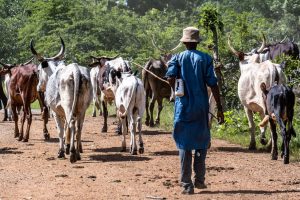
NEC CALLS FOR LIVESTOCK REARING SHAKE-UP AMID FARMER-HERDER CLASHES

The National Economic Council on Thursday kicked against the current livestock rearing system in Nigeria, saying there is a need to change from the old ways to modern practice.
The Council, chaired by Vice President Kashim Shettima, took the stand during its meeting at the Presidential Villa, Abuja.
The meeting comes amidst the spate of attacks in parts of the country, including Plateau, Benue, and Kwara States where scores of citizens have been killed by suspected gunmen.
Briefing State House Correspondents shortly after the meeting, Governor Douye Diri of Bayelsa State said NEC emphasised the need to work towards modernising livestock production in Nigeria.
“Council emphasised the fact that we cannot continue to live in the past, and we must now work towards modernising livestock production in Nigeria,” he said.
According to him, the council noted that the current system of animal husbandry in the country is fuelling the farmers/herders clash, as witnessed recently in parts of the country.
Governor Diri explained that the new Ministry of Livestock Development has also revealed an Accelerated Livestock Development and Growth Strategy, which targets to boost revenue generation from the sector to between $70 billion and $90 billion by 2035.
Clashes between nomadic cattle herders and farmers over land use are common in central Nigeria.
Benue State Governor Hyacinth Alia had earlier blamed the recent attacks in the Ukum and Logo local government areas on “suspected herdsmen”.
With many herders belonging to the Muslim Fulani ethnic group, and many farmers Christian, the attacks in the Middle Belt often take on a religious or ethnic dimension. Two attacks by unidentified gunmen earlier this month in neighbouring Plateau state left more than 100 people dead.
Back-to-back massacres — more than 50 people killed in two districts — in Plateau state this month have marked a serious escalation in the state, with authorities scrambling to contain the attacks in a region where ethnic tensions have long simmered.
Families of slain Plateau residents weep after marauders killed their loved ones in overnight attacks
Plateau state authorities have claimed the killings were part of a “genocide” that was “sponsored by terrorists”.
Critics say that rhetoric masks the true causes of the conflict — disputes over land and a failure by authorities and police to govern the countryside.
A local herder group denounced the Plateau state killings while also noting that its own members have been under attack by farmers.
Land grabbing, political and economic tensions between local “indigenes” and those considered outsiders, as well as an influx of hardline Muslim and Christian preachers, have heightened divisions in Plateau state in recent decades.
When violence flares, weak policing all but guarantees indiscriminate reprisal attacks.
Across the wider Middle Belt, including in Benue, land used by farmers and herders is coming under stress from climate change and human expansion, sparking deadly competition for increasingly limited space.
